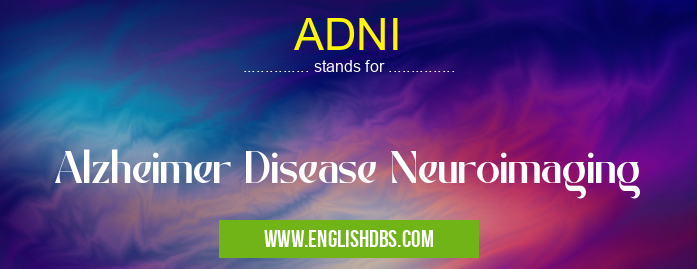What does ADNI mean in HOSPITALS
ADNI stands for Alzheimer's Disease Neuroimaging Initiative. It is a longitudinal study that began in 2004 and is designed to track the progression of Alzheimer's disease (AD) and other neurodegenerative diseases using biomarker and clinical data.

ADNI meaning in Hospitals in Medical
ADNI mostly used in an acronym Hospitals in Category Medical that means Alzheimer Disease Neuroimaging
Shorthand: ADNI,
Full Form: Alzheimer Disease Neuroimaging
For more information of "Alzheimer Disease Neuroimaging", see the section below.
What is ADNI?
ADNI is a collaborative research effort involving multiple institutions across the United States and Canada. The study enrolls participants who are either cognitively normal or have mild cognitive impairment (MCI), and follows them over time to assess changes in their cognitive function, brain structure, and biomarkers of AD.
Key Features of ADNI
- Longitudinal design: ADNI participants are followed over multiple years, allowing researchers to track the progression of disease over time.
- Multimodal data collection: ADNI collects a wide range of data from participants, including clinical assessments, neuroimaging scans (such as MRI and PET), and biomarker measurements (such as amyloid and tau levels in cerebrospinal fluid).
- Standardized protocols: ADNI uses standardized protocols for data collection and analysis, ensuring consistency and reliability across sites.
- Open-access data: The ADNI dataset is publicly available to researchers, facilitating collaboration and accelerating research progress.
Essential Questions and Answers on Alzheimer Disease Neuroimaging in "MEDICAL»HOSP"
What is ADNI?
ADNI (Alzheimer's Disease Neuroimaging) is a multi-site longitudinal study that seeks to validate the use of biomarkers for the early detection and tracking of Alzheimer's disease (AD). The study follows cognitively normal individuals, those with mild cognitive impairment (MCI), and those with mild AD over time, collecting data on their clinical, cognitive, genetic, and imaging characteristics.
What types of biomarkers are studied in ADNI?
ADNI researchers study a range of biomarkers, including:
- Structural biomarkers: Changes in brain structure visible on MRI scans, such as hippocampal atrophy.
- Functional biomarkers: Measures of brain activity, such as those obtained from PET scans and fMRI.
- Biofluid biomarkers: Proteins, metabolites, and other molecules found in cerebrospinal fluid and blood that may indicate the presence or progression of AD.
- Genetic biomarkers: Variations in genes that may increase the risk of developing AD.
How does ADNI contribute to the fight against Alzheimer's disease?
ADNI's findings help researchers:
- Identify and validate biomarkers for early detection and tracking of AD.
- Understand the natural history and progression of AD.
- Develop new treatments and interventions for AD.
What are the ethical considerations in ADNI research?
ADNI researchers prioritize the ethical treatment of participants. The study:
- Obtains informed consent from all participants.
- Protects the privacy and confidentiality of participant data.
- Monitors participants' well-being and provides medical care as needed.
How can I participate in ADNI?
To participate in ADNI, you must meet certain eligibility criteria and live near one of the participating research sites. For more information and to inquire about eligibility, visit the ADNI website: https://www.adni-info.org/
Final Words: ADNI has made significant contributions to our understanding of AD and other neurodegenerative diseases. The study has provided valuable insights into the biological processes underlying these diseases, and has helped identify potential biomarkers for early detection and monitoring. ADNI continues to play a crucial role in advancing research on AD and other neurodegenerative disorders.
ADNI also stands for: |
|
| All stands for ADNI |
